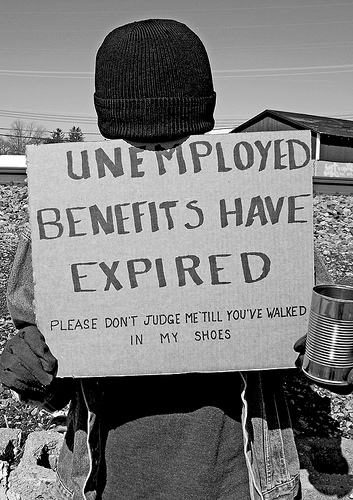
Flickr/<a href="http://www.flickr.com/photos/46750903@N08/4412191242/">Blue Jay Day</a>
On Thursday afternoon, despite eight weeks of haggling and dealbrokering, the Senate rejected extending unemployment benefits amidst rising deficits but at a time when one in 10 people are jobless. The 57-41 vote against the tax extender bill, which would’ve also given tax breaks to small and large businesses, was the third time Democrats failed break a GOP filibuster, and the bill’s failure leaves upwards of 1.2 million unemployed Americans still without help. “They have taken the filibuster and made the Senate dysfunctional,” Sen. Dick Durbin, the majority whip, told Politico, referring to Senate Republicans.
Those GOPers who opposed the bill typically cited fears about the country’s spiraling deficits, railing on the fact that the jobs bill would’ve cost $100 billion and added $33 billion to the deficit. Despite the obvious need for the extended unemployment insurance, it’s not hard to see why GOPers, however wrongheaded or hypocritical, would vote against this.
Then there’s centrist Sen. Ben Nelson (D-Neb.), who bucked his Democratic colleagues and voted against the bill. Nelson, in particular, took issue with his colleagues’ reasoning for why the unemployment benefits, unlike the rest of the bill, weren’t paid for. Traditionally, unemployment benefits are green-lit without being paid for because they’re deemed an emergency. Democrats have done it this way; Republicans have, too. And as Sen. Debbie Stabenow told reporters yesterday afternoon, the same should’ve applied to the current jobs bill: “15 million people unemployed,” she stressed, “is an emergency.”
Not so, according to Ben Nelson. “I don’t buy that distinction,” Nelson said yesterday. “At some point, it ceases to be an emergency. It’s ongoing…I think the bill should be paid for.”
A record 6.7 million people out work for six months or more, real unemployment rate of 16.6 percent, a growing class of Americans who’ve completely exhausted all unemployment support, known as “99ers”—none of that qualifies as an emergency for Nelson. Well, at least we know where Nelson stands. That certainly contradicts what the American public thinks, with a majority of people ranking jobs and the economy’s woes as the nation’s biggest problems right now. If there was ever a case of a politician out of touch with what those outside the Beltway think, this would be it.
















